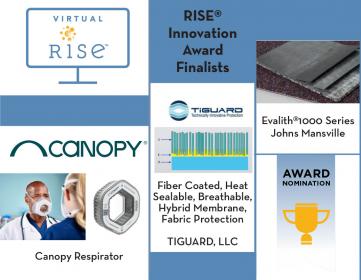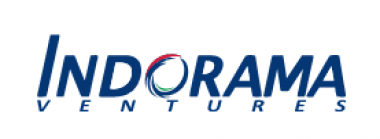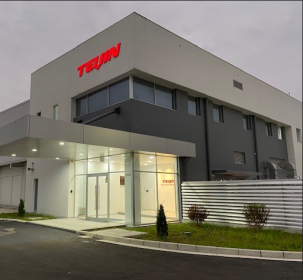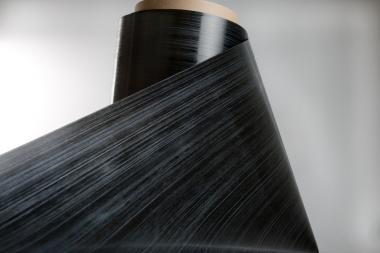INDA Announces the 2021 RISE® Innovation Award Finalists
- Innovations in Protection, Efficiency and Engineered Fabrics
INDA, the Association of the Nonwoven Fabrics Industry, announced the three finalists for the prestigious RISE® Innovation Award during the 11th edition of the Research, Innovation & Science for Engineered Fabrics Conference, (RISE®) to be held virtually September 28-30, 2021. The award recognizes novel innovations in the nonwovens industry that creatively use next-level science and engineering principles to solve material challenges and expand the usage of nonwovens and engineered fabrics. These three finalists will present their innovative material science solutions as they compete for the RISE® Innovation Award.
Canopy Respirator
Canopy is an innovative respirator that is fully mechanical, non-electrostatic, with a filter designed for superior breathability while offering the wearer facial transparency. The breakthrough respirator features 5.5mm water column resistance at 85 liters (3 cubic feet) per minute, 2-way filtration, and a pleated filter that contains over 500 square centimeters of surface area. The patented Canopy respirator resists fluids, and eliminates fogging of eyeglasses.
Evalith® 1000 Series
Johns Manville’s innovative Alpha Binder is a formaldehyde-free, high bio-carbon content, toxic-free binder formulation ideal for carpet mat applications. Alpha Binder eliminates monomer and polymer synthesis, uses a bio-degradable catalyst, and requires 70% less water in manufacturing. The resulting glass mats made of Alpha Binder are named “Evalith 1000” and reduces energy consumption during manufacturing by over 70% compared to alternative petroleum-based binders. Evalith 1000 was commercialized in North America in 2020.
Fiber Coated, Heat Sealable, Breathable, Hybrid Membrane, Fabric Protection
TiGUARD protective fabric is a construction of monolithic or hybrid imperious/moisture eliminating membranes with a surface covered with micro-fiber. This nonwoven product is a multi-layer all polyester fabric specifically for chemical and microbial protective fabrics, products, and garments. It is constructed of compatible heat seal-able materials which lend themselves to high-speed heat seal-able production and ultimately automated manufacture of garments without sewing. It is a combination of a densely flocked polyester fiber surface on polyester membrane supported by polyester scrim.
Virtual RISE™ conference attendees include technology scouts and product developers in the nonwoven/engineered fabrics industry seeking new developments to advance their businesses. These attendees will electronically vote for the recipient of the 2021 RISE® Innovation Award, on Wed. Sept. 29th. The winner will be announced Thurs., Sept. 30th.
The conference program will cover timely and relevant industry topics including: Material Science Developments for Sustainable Nonwovens; Increasing Circularity in Nonwovens; Market Intelligence & Economic Insights; Promising Innovations in Nonwovens; Process Innovations in Nonwovens; Material Innovations in Nonwovens; the full program can be viewed on the link: https://www.riseconf.net/conference.php



















